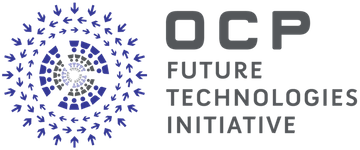AI HW SW CoDesign Workstream

- Project Lead
- Weifeng Zhang
The OCP Future Technologies Initiative is a formal project within the Foundation whose mission is to build a future-focused Community within OCP to serve as forward-looking funnel for ideas and technologies three-to-five years into the future.
In 2019, the Foundation initiated the OCP Future Technologies Symposium, a bi-annual event that features a call for posters, and brings together academia, the technology industry, startups, venture capital and analyst firms to solve future challenges facing the industry, and accelerate productization through partnerships and open source R&D. All submissions are featured and the winners are announced at the Summit events OCP holds each year.
At the end of 2020, the Symposium and Foundation leaders decided it was time to organize a regular interface with the OCP Community and the research industry to better focus their continued efforts and to initiate funding and commercialization of these early stage innovations. Focused on building pipelines of talent to work on specific problems, the OCP Future Technologies Initiative will ultimately hand off promising efforts to OCP Projects, with the ultimate goal of commercialization.
Get Involved
There are several ways to get involved in the OCP Future Technologies Initiative:
- Join the mailing list to receive updates: FTI Mailing list
- Join the mailing list of this workstream: AI HW-SW CoDesign Mailing list
- Join the conversation in the FTI LinkedIn Group
- Connect with the FTI team and the community, give advice and contribute.
- Join the OCP Future Technologies Symposium, submit a paper, propose participants, attend!
OCP FTI - Hardware Software CoDesign Calendar
The calendar displayed here is updated nightly from the project's Groups.io Calendar
Past FTI Events
- 2021 Future Technologies Initiative Kickoff Webinar
Scope
The OCP Future Technologies Initiative is a formal project within the Foundation whose mission is to build a future-focused Community within OCP to serve as forward-looking funnel for ideas and technologies three-to-five years into the future.
In 2019, the Foundation initiated the OCP Future Technologies Symposium, a bi-annual event that features a call for posters, and brings together academia, the technology industry, startups, venture capital and analyst firms to solve future challenges facing the industry, and accelerate productization through partnerships and open source R&D. All submissions are featured and the winners are announced at the Summit events OCP holds each year.
At the end of 2020, the Symposium and Foundation leaders decided it was time to organize a regular interface with the OCP Community and the research industry to better focus their continued efforts and to initiate funding and commercialization of these early stage innovations. Focused on building pipelines of talent to work on specific problems, the OCP Future Technologies Initiative will ultimately hand off promising efforts to OCP Projects, with the ultimate goal of commercialization.